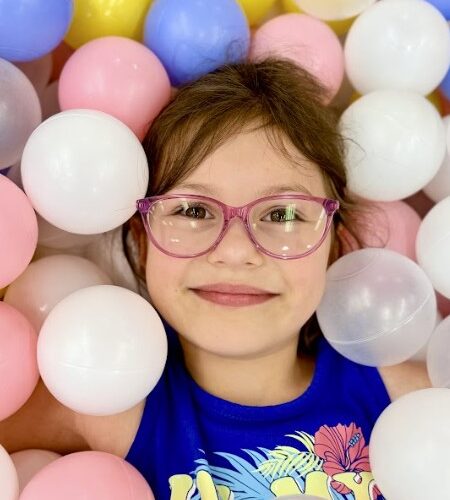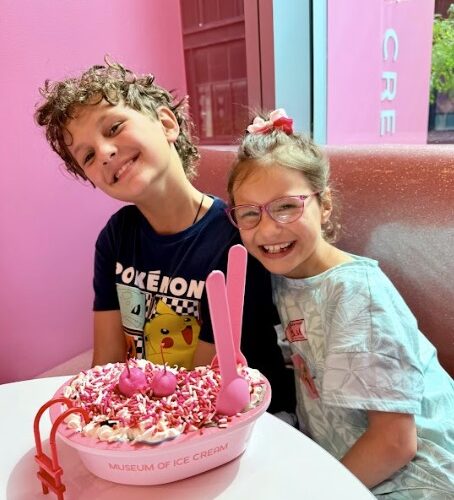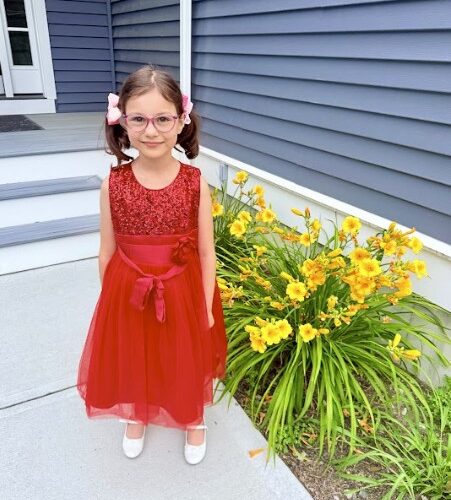Julia picks wildflowers outside while her family waits in line at the ice cream parlor. When she hands little bouquets to her mother, father, and brother, they ask why she doesn’t keep one for herself. Julia smiles: “I don’t need flowers. Seeing you happy makes me happy.” That’s Julia—generous, joyful, and full of light, even as her body struggles to keep up.
At just two months old, Julia wasn’t gaining weight. Her head was unusually small, and doctors detected a heart murmur. From then on, she continued to miss developmental milestones and encounter medical issues. When Julia was 15 months old, her mother, Olga, enrolled her in early intervention therapies. Julia faced multiple hospitalizations, fatigue, and weak muscle tone, yet no one could explain why. Specialists reassured Olga that her daughter was fine, but her instincts told her otherwise.


In November 2024, Julia caught the flu. At first, it seemed mild. But soon she woke up incoherent. She stopped speaking, refused food, and resisted medication. At the local ER, staff dismissed Julia as “attention-seeking.” They even demonstrated unsafe ways of forcing medicine into her mouth, which made her choke. Trusting her gut, Olga turned away from their advice and drove her daughter to Boston Children’s Hospital.
Doctors there admitted Julia immediately. They discovered severe inflammation of her brain, putting pressure on her brainstem. She had lost her ability to talk, move, swallow, and connect emotionally. In the ICU, her older brother, Andrew, brought her favorite Barbies to her bedside, but Julia stared right through him. Her family feared her light was gone forever.
A feeding tube, wheelchair, and pointing to paper signs became Julia’s new reality. Then, three weeks into rehab, she defied the odds. She spoke her first word again: “Mama.” For Olga, it remains her most cherished memory. “We told her that when she finally got out of the hospital, we’d throw a big bash. She could ride in on a pony, wear a princess gown, and eat all the chips in the world—her favorite food.”
Then came the call. The geneticist sounded like he had just solved an impossible equation, not like he was about to deliver heart-shattering news. Their tests confirmed that Julia had ATP6 mitochondrial disease, Leigh Syndrome. Only five percent of her mitochondria were functioning. Now having a terminal diagnosis, a party was the furthest thing from their minds.
Olga also learned she carried the same variant, though she did not have Leigh syndrome. It was validating to discover that her lifelong struggles with fatigue and weakness had a medical explanation, not just personal weakness as she had been told. Still, the guilt of passing this gene on to her daughter nearly crushed her.
She and her husband grieved and questioned everything: Should they quit their jobs to spend every last moment with Julia? Should they give her everything she wants? How much time do they have?


Months later, Olga has learned the importance of acceptance. “I still go on dates with my husband. I still make time for friends. As painful as it is, I realize we will likely outlive Julia. If we don’t have anything else in our own lives when she’s gone, we’ll have nothing.”
Julia loves socializing at school, now relying on eyeglasses and a wheelchair. She isn’t always fully accepted by her peers, and many assume her small stature means she’s younger than she is. Olga is searching for a therapist who can help Julia understand and cope with her terminal diagnosis. Books like My Mighty Mito provide some comfort, but Olga longs for more resources for families facing the dark realities of raising a child with a rare, life-limiting condition.
Through it all, Olga clings to a simple but powerful mantra: be here now. Inscribed on her bracelet, it is a daily reminder to savor each moment. “When you go on vacation, you know it will end. But you don’t spend the trip dreading your departure. You enjoy the experience, soak it all in, and make memories,” she shares. “Julia is my vacation.”
This year, both Julia and her brother Andrew celebrate golden birthdays. Their family will honor these milestones with gratitude for each day together. They will continue their traditions, like choosing Christmas ornaments to symbolize their year. Olga and her husband once planned to give those ornaments to Andrew and Julia when they moved into homes of their own. While their hopes for the future have changed, one thing remains: Julia and her family are here—now—living each moment to the fullest.



